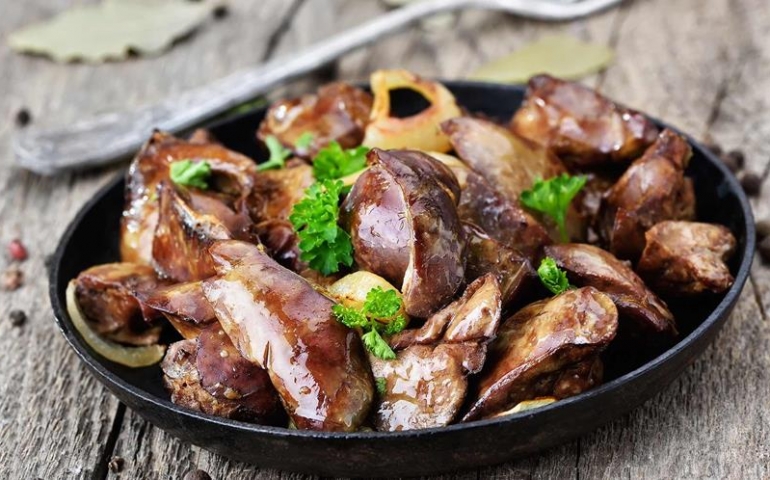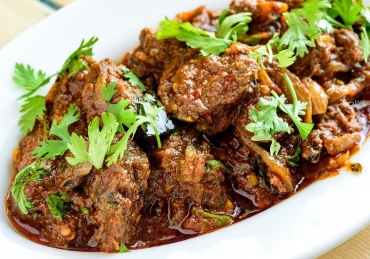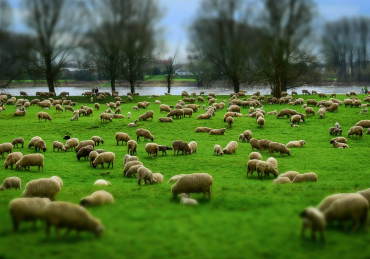What should a person do with his Qurbānī meat?
Is it Sunnah to eat the liver first from a Qurbānī animal?
Question
(1) What should a person do with his Qurbānī meat? Should he distribute it or eat it himself? Please outline the position of all four schools of thought.
(2) Is it Sunnah to eat the liver first from a Qurbānī animal?
Read the answer below or click here to read in PDF format: What should you do with Qurbani meat and should you eat the liver first
بسم الله الرحمن الرحيم
Answer
(1) What should a person do with his Qurbānī meat?
Almighty Allah says in the Qurʾān (22: 36):
فكلوا منھا وأطعموا القانع والمعتر
“Eat from them and feed the content [poor person] and the beggar.”
The Prophet of Allah ﷺ said:
فكلوا وادخروا وتصدقوا
“So eat, preserve and donate”.[1]
Accordingly, there are three actions in relation to the Qurbānī meat as follows:
- Eating from your Qurbānī animal is mustaḥab (desirable) according to all four schools of thought and necessary according to some scholars.[2] This has been described as hospitality from Allah[3] and for this reason it is Sunnah to eat after Eid Ṣalāh as the Prophet ﷺ would not eat until he would return from Eid Ṣalāh and thereafter eat from his Qurbānī.[4] Thus, it is mustaḥab (desirable) to make the Qurbānī meat the first thing a person consumes on Eid al-Aḍḥā.[5] This is why, along with performing Qurbānīs abroad, families should perform Qurbānīs locally so they can fulfil this noble Sunnah, acquire its benefits and instil its significance within children.
- Donating some of the meat is also recommended according to the Ḥanafī and Mālikī schools of thought, whilst it is necessary to donate at least some meat according to the Shāfiʿī and Ḥanbalī schools of thought.[6]
- It is permissible to store and preserve some of the meat according to all four schools of thought.[7]
Scholars have further recommended how to split the meat:
- Many Ḥanafī scholars suggest that it is preferable to eat a third, donate a third and preserve a third.[8] Some Ḥanafī scholars suggest donating a third and eating two thirds[9] whilst some suggest the opposite if a person is wealthy.[10]
- Some Mālikī scholars suggest that it is preferable to eat a third, donate a third and preserve a third.[11] Others suggest eating a third and donating two thirds[12] whilst some suggest donating half and eating half.[13] Imam Mālik (d. 179/795) however would not specify the proportion and would advise generally to eat and donate.[14]
- Some Shāfiʿī scholars suggest it is preferable to eat half and donate half. Others suggest eating a third and donating two thirds whilst some suggest eating a third, donating a third and distributing a third to whomsoever a person wishes. Imam Gazālī (d. 505/1111) suggests it is preferable to eat a third, donate a third, and preserve a third, a view that has been rejected by the Shāfiʿī scholars.[15]
- The Ḥanbalī scholars suggest it is preferable to donate a third, distribute a third to whomsoever he wishes (family and associates) and eat a third.[16]
In conclusion, it is desirable to for a person to eat from the meat himself and also distribute it to the poor and others. It is also permissible to preserve and store the meat for future use.
(2) Is it Sunnah to eat the liver first from a Qurbānī animal?
It is Sunnah for a person to eat from his Qurbāni animal as outlined above.
In relation to eating the liver first, we have not come across any Ḥanafī jurist who has specified this as a Sunnah.[17] However, some scholars have indicated their preference to start with the liver or that the liver is the best part of the animal. Imam Shāfiʿī (d. 204/820) writes in his book al-Umm (2: 239):
وأحب أن یأكل من كبد ذبیحته قبل أن یفیض أو لحمھا
“I prefer that he [the pilgrim] eats from the liver of his slaughter before he performs Ṭawāf or [that he eats] its meat.”
The Shāfiʿī scholars ʿAllāmah Ibn Ḥajar al-Makkī (d. 974/1567) and ʿAllāmah Ramlī (d. 1004/1596) suggest that the best part of the Qurbānī animal is the liver.[18] The Shāfiʿī scholar ʿAllāmah Munāwī (d. 1031/1622) suggests that the Prophet ﷺ would [specifically] eat the liver of the sacrifice.[19] Some Mālikī scholars including ʿAllāmah Abū al-Ḥasan ʿAli al-ʿAdawī (d. 1189/1775) and ʿAllāmah Muḥammad ʿIllīsh (d. 1299/1882) concur with this and explain that a person should begin with the liver for several reasons: Firstly, because it was the practice of the Prophet ﷺ, secondly, it cooks faster, and thirdly the first food in paradise shall be the liver of the fish according to some narrations.[20] The Shāfiʿī scholar Imam Bayhaqī (d. 458/1066) writes:
والسنة في عيد الأضحى أن لا يأكل حتى يذبح أضحيته بعد الصلاة ثم يرجع فيأكل من كبد أضحيته
“The Sunnah in Eid al-Aḍḥā is that he does not eat until he slaughters his animal after Ṣalāh, then he returns and eats from the liver of his sacrifice.”[21]
Similarly, Imam Isḥāq ibn Rāhwayh/Rāhūyah (d. 238/853) said:
وأما الأضحى فإن السنة ألا يأكل حتى يرجع فيبدأ فيأكل من كبد أضحيته
“As regards [Eid] al-Aḍḥā, the Sunnah is that he does not eat until he returns. Then he should start and eat from the liver of his sacrifice.”[22]
The basis of this is found in the narration of Buraydah (d. 62/681-2) (may Allah be pleased with him) which has already been referred to which states that the Prophet ﷺ would not eat on Eid al-Aḍḥā until he returned [from Eid Ṣalāḥ]. This narration has been transmitted in Musnad Aḥmad (22983, 22984), Sunan Ibn Mājah (1756), Musnad Abū Dāwūd al-Ṭayālisī (849), Ṣaḥīḥ Ibn Khuzaymah (1426), Ṣaḥīḥ Ibn Ḥibbān (2812), Sunan al-Dāraquṭnī (1715), Sunan al-Tirmidhī (542), al-Mustadrak (1088) and other ḥadīth collections. This narration is ṣaḥīḥ (sound) as affirmed by Imam Ibn Khuzaymah (d. 311/924), Imam Ibn Ḥibbān (d. 354/965), Imam Ḥākim (d. 405/1014), Imam Dhahabī (d. 748/1348) and Imam Ibn al-Qaṭṭān (d. 628/1231).[23]
The narration of Musnad Aḥmad (22984), Sunan al-Dārimī (1641), al-Muʿjam al-Awsaṭ (3065), Sunan al-Dāraquṭnī (1715), al-Sunan al-Kubrā (6160) and Maʿrifah al-Sunan wa al-Āthār (5: 61) adds the following or similar:
فیأكل من أضحیته
“And he would eat from his sacrifice.”
Imam Ibn al-Qaṭṭān (d. 628/1231) has deemed this addition as transmitted in Sunan al-Dāraquṭnī as ṣaḥīḥ (sound).[24] Ḥāfiẓ Jamāl al-Dīn al-Zaylaʿī (d. 762/1360) and Mullā ʿAlī al-Qārī (d. 1014/1605) both appear to agree with him.[25] This is based on the principle that the addition of a thiqah (trustworthy) transmitter is accepted, and Thawāb ibn ʿUtbah (n.d.) who transmits this addition in the chain of Sunan al-Dāraquṭnī (and al-Sunan al-Kubrā and Maʿrifah al-Sunan wa al-Āthār) is a trustworthy narrator according to Imam Ibn Maʿīn (d. 233/848).[26] It is worth noting that this addition makes no reference to the liver.
The narration that refers to the liver has been narrated by Imam Bayhaqī (d. 458/1066) in al-Sunan al-Kubrā (6161) and Maʿrifah al-Sunan wa al-Āthār (5: 61). The narration has the following addition:
وكان إذا رجع أكل من كبد أضحیته
“And when he would return, he would eat from the liver of his sacrifice.”
The chain of this narration is weak because of ʿUqbah ibn ʿAbd Allah al-Aṣamm (d. 166/782-3). Yaḥyā ibn Maʿīn (d. 233/848) said: “He is nothing.” Imam Abū Dāwūd (d. 275/889) said: “Weak”. Imam Nasāʾī (d. 303/915) and Yaḥyā ibn Maʿīn (d. 233/848) said: “He is not trustworthy.” Imam Abū Ḥātim al-Rāzī (d. 277/890) accused him of narrating munkar (unknown) narrations. Ḥāfiẓ Dhahabī (d. 748/1348) said: “Al-Fallās and the people (muḥaddithūn) have weakened him.” Imam Sājī (d. 307/919-20) said: “His ḥadīths cannot be used as evidence and there is weakness in him.”[27] He has been regarded as trustworthy by a very small group of scholars. However, Imam Ibn ʿAdī (d. 365/976) summarises his credentials when he said: “Some of his narrations are proper and some are not corroborated by anyone else.”[28] Imam Abū Ḥātīm (d. 277/890) described two of his narrations from ʿAbd Allah ibn Buraydah (d. 115/733-4) (who is also the transmitter of this ḥadīth) as munkar (unknown).[29] Thus, it is clear that the singular additions of such a narrator will not be accepted. It is also worth noting that the narration of Musnad Aḥmad (22984) that transmits the addition فیأكل من أضحیته and the narration of Sunan al-Dārimī (1641) and al-Muʿjam al-Awsaṭ (3065) that transmits the addition فیأكل من ذبیحته are all narrated via ʿUqbah ibn ʿAbd Allah (d. 166/782-3). This also indicates that the addition of liver which is singularly reported by Imam Bayhaqī (d. 458/1066) is not authentic.[30]
In conclusion, there is no harm in eating the liver of the Qurbānī animal first especially because it cooks faster and it is desirable to rush towards good deeds and hasten towards the hospitality of Allah. It is perhaps for this reason that Imam Isḥāq ibn Rāhwayh/Rāhūyah (d. 238/853) and others advised to eat the liver first. It is Sunnah to eat from the Qurbānī animal in general and this includes the liver and one will be rewarded accordingly. This is reflected in the statement of Imam Shāfiʿī (d. 204/820) quoted above.
Allah knows best
Yusuf Shabbir
8 Dhū al-Ḥijjah 1437 / 10 September 2016
Approved by: Mufti Shabbir Ahmad Sahib
Footnotes
[1] Ṣaḥīḥ Muslim (1971).
[2] Badāʾiʿ al-Ṣanāʾiʿ (5: 80); al-Istidhkār (5: 234); al-Dhakhīrah (4: 159); al-Majmūʿ (8: 414); al-Mugnī (9: 449); Ikmāl al-Muʿlim (6: 425).
[3] Badāʾiʿ al-Ṣanāʾiʿ (5: 80); al-Bināyah (3: 121).
[4] Musnad Aḥmad (22984); Sunan al-Dārimī (1641); al-Muʿjam al-Awsaṭ (3065); Sunan al-Dāraquṭnī (1715); al-Sunan al-Kubrā (6160) and Maʿrifah al-Sunan wa al-Āthār (5: 61). More details regarding this narration are outlined in the next section.
[5] Al-Bināyah (3: 121); al-Fatāwā al-Hindiyyah (1: 150).
[6] Badāʾiʿ al-Ṣanāʾiʿ (5: 81); al-Istidhkār (5: 234); Ikmāl al-Muʿlim (6: 425); al-Majmūʿ (8: 416); al-Mugnī (9: 449); al-Inṣāf (6: 491).
[7] Badāʾiʿ al-Ṣanāʾiʿ (5: 81); al-Istidhkār (5: 233); Ikmāl al-Muʿlim (6: 427); al-Majmūʿ (8: 418); al-Mugnī (9: 449).
[8] Badāʾiʿ al-Ṣanāʾiʿ (5: 81); al-Bināyah (4: 484); al-Baḥr al-Rāʾiq (3: 76); Radd al-Muḥtār (2: 615; 6: 328).
[9] Al-Mabsūṭ (4: 76).
[10] Tuḥfat al-Fuqahā (3: 87).
[11] Al-Dhakhīrah (4: 159); al-Istidhkār (5: 233).
[12] Al-Dhakhīrah (4: 159); Ikmāl al-Muʿlim (6: 426).
[13] Al-Istidhkār (5: 234); Ikmāl al-Muʿlim (6: 426).
[14] Ibid.
[15] Al-Majmūʿ (8: 415; 418).
[16] Al-Mugnī (9: 448).
[17] Imam Ṭaḥṭāwī (d. 1231/1816) in his commentary on Marāqī al-Falāḥ (p. 536) and ʿAllāmah ʿAynī (d. 855/1451) in ʿUmdat al-Qārī (6: 275) have cited the liver narration as transmitted in al-Sunan al-Kubrā without commenting on it.
[18] Tuḥfat al-Muḥtāj (9: 365); Nihāyat al-Muḥtāj (8: 142).
[19] Fayḍ al-Qadīr (1: 396).
[20] Ḥāshiyat al-ʿAdawī ʿalā Sharḥ Mukhtaṣar Khalīl li al-Kharashī (2: 102); Ḥāshiyat al-ʿAdawī ʿalā Kifāyat al-Ṭālib al-Rabbānī (1: 515); Minaḥ al-Jalīl (1: 464). Also see al-Fawākih al-Dawānī (1: 275, 383), Bulghat al-Sālik (1: 528).
[21] Faḍāʾil al-Awqāt (p. 402).
[22] Masāʾil al-Imam Aḥmad wa Isḥāq Ibn Rāhwayh (2: 376).
[23] Bayān al-Wahm wa al-Īhām (5: 355).
[24] Ibid.
[25] Naṣb al-Rāyah (2: 208); Mirqāt al-Mafātīḥ (3: 107).
[26] Tārīkh Ibn Maʿīn (4: 135, 272). It is worth noting that some scholars like Imam Abū Ḥātim (d. 277/890) and Abū Zurʿah (d. 264/878) do not regard him trustworthy, as narrated in al-Jarḥ wa al-Taʿdīl (2: 471) and highlighted in al-Badr al-Munīr (5: 72). Nevertheless, Imam Yaḥyā ibn Maʿīn (d. 233/848), Imam Ibn al-Qaṭṭān (d. 628/1231), Ḥāfiẓ Zaylaʿī (d. 762/1360) and others regard him as trustworthy. Similarly, Imam Ibn Ḥibbān (d. 354/965) regards him as trustworthy in al-Thiqāt (6: 130). Imam Ibn ʿAdī (d. 365/976) appears to be inclined towards this in al-Kāmil (2: 309) particularly in relation to this transmission. Imam Abū ʿAlī al-Ṭūsī (d. 312/924-5) regards him as a good ḥadīth authority. Based on these statements, Ḥāfiẓ Ibn Ḥajar (d. 852/1449) describes him as maqbūl (acceptable). For further details, see Tahdhīb al-Kamāl (4: 412), Mīzān al-Iʿtidāl (1: 373), Tahdhīb al-Tahdhīb (2: 30), Taqrīb al-Tahdhīb (p. 134).
[27] Mīzān al-Iʿtidāl (3: 86); al-Jarḥ wa al-Taʿdīl (6: 314); Tahdhīb al-Kamāl (20: 206); Tahdhīb al-Tahdhīb (7: 244). Ḥāfiẓ Dhahabī (d. 748/1348), Ḥāfiẓ Mizzi (d. 742/1341), Ḥāfiẓ Ibn Ḥajar (d. 852/1449) and others have indicated that ʿUqbah ibn ʿAbd Allah al-Rifāʿī is the same person, highlighting the error of Imam Ibn Abī Ḥātim (d. 327/938) and Imam Bukhāri (d. 256/870) who have treated them as two different people in al-Jarḥ wa al-Taʿdīl (6: 314) and al-Tārīkh al-Kabīr (6: 441) respectively.
[28] Al-Kāmil fī Ḍuʿafāʾ al-Rijāl (6: 491). Imam Ibn ʿAdī (d. 365/976) also regards both as the same person.
[29] ʿIlal al-Ḥadīth (5: 274, 365).
[30] There are three additional important points to note here:
Firstly, the chain of Imam Bayhaqī (d. 458/1066) also includes Walīd ibn Muslim (d. 195/810) who is a trustworthy narrator but famous for frequently committing tadlīs (concealing transmitters). See Tahdhīb al-Kamāl (31: 86), Mīzān al-Iʿtidāl (4: 347) and Taqrīb al-Tahdhīb (p. 547). However, there is explicit mention in the chain that he transmitted the narration directly from his teacher, and therefore this cannot be used to question the authenticity of the chain.
Secondly, Imam Bayhaqī (d. 458/1066) transmits this addition of the liver in Faḍʾāil al-Awqāt (215) through the chain of Thawāb ibn ʿUtbah (n.d.). However, it is worth noting that Imam Bayhaqī has transmitted the same narration with the same chain in al-Sunan al-Kubrā (6160), as outlined above, and the narration makes no reference to the word liver. Thus, it seems as though that the addition of the word liver in the narration is a typing or transmission error. This is supported by the fact that thereafter Imam Bayhaqī makes reference to the transmission of ʿUqbah (d. 166/782-3) and quotes the specific addition regarding the liver to substantiate his point. This is also supported by the fact that the narrations of Musnad Aḥmad (22984), Sunan al-Dārimī (1641), al-Muʿjam al-Awsaṭ (3065), Sunan al-Dāraquṭnī (1715) and Maʿrifah al-Sunan wa al-Āthār (5: 61) transmit the addition of Thawāb ibn ʿUtbah (n.d.) and it does not mention the liver, as outlined above.
Thirdly, Ḥāfiẓ Ibn Ḥajar (d. 852/1449) mentions in al-Talkhīṣ al-Ḥabīr (4: 264) that he has discussed the liver narration earlier in the book. However, I have been unable to find any reference to this addition earlier in the book (2: 169) where Ḥafiẓ Ibn Ḥajar has discussed the narration of Buraydah (d. 62/681-2) (may Allah be pleased with him). Allah Almighty knows best.







